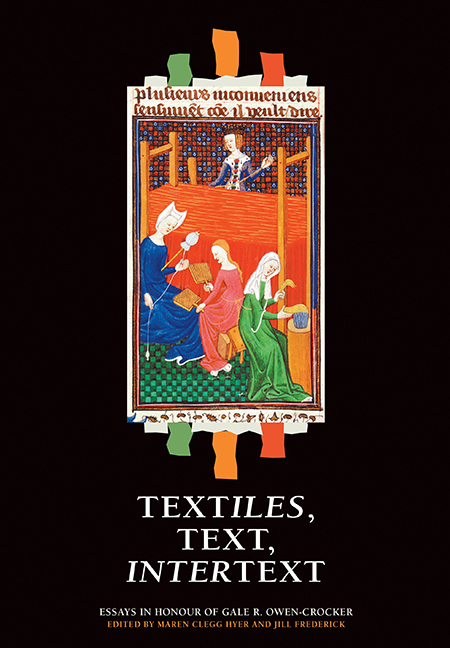Book contents
- Frontmatter
- Contents
- List of Illustrations
- List of Abbreviations
- Introduction
- A Personal Recollection
- List of publications of Gale R. Owen Crocker
- Part I Textile
- Part II Text
- 6 Text, Textile, Context: Aldhelm and Wordweaving as Metaphor in Old English
- 7 The Weft of War in the Exeter Book Riddles
- 8 Fyrenne Dracan in the Anglo-Saxon Chronicle
- 9 Old English in the Margins
- Part III Intertext
- Index
- Tabula Gratulatoria
6 - Text, Textile, Context: Aldhelm and Wordweaving as Metaphor in Old English
from Part II - Text
Published online by Cambridge University Press: 05 July 2016
- Frontmatter
- Contents
- List of Illustrations
- List of Abbreviations
- Introduction
- A Personal Recollection
- List of publications of Gale R. Owen Crocker
- Part I Textile
- Part II Text
- 6 Text, Textile, Context: Aldhelm and Wordweaving as Metaphor in Old English
- 7 The Weft of War in the Exeter Book Riddles
- 8 Fyrenne Dracan in the Anglo-Saxon Chronicle
- 9 Old English in the Margins
- Part III Intertext
- Index
- Tabula Gratulatoria
Summary
I knew Gale R. Owen-Crocker by reputation several years before we met: she was a trusted source in my research into the textiles and textile imagery of the Anglo-Saxon peoples. One day in my graduate school years, my advisor at University of Toronto, Dr Roberta Frank, gave me advice for which I will forever thank her: to take courage and submit an abstract to Dr Owen-Crocker for a planned session themed around our joint interests at the International Congress on Medieval Studies at Kalamazoo. It was there that I met Gale in person. She rapidly became both a mentor and a life-long friend. It is only fitting that, as often as I have taken her work as inspiration, I take as point of departure for this chapter something Gale once observed: Aldhelm of Malmesbury appears to gravitate towards the use of visually evocative textile imagery, including “abundant metaphors, which, significantly, include many references to garments and textile production”.
This chapter will examine closely one of the many textile metaphors of Aldhelm, the textual-textile metaphor of “wordweaving”. I will trace his own sources of inspiration, from the textile metaphor-intensive context of his textual environment, to the textile-intensive culture of his material environment. I will also look at the life of the metaphor after Aldhelm, for there is an interesting one. In Anglo-Latin texts, the metaphor often subsequently occurs among those who may be considered admirers or devotees of Aldhelm, and a significant handful of these are linked to texts written by, commissioned by, or written for women. The consequent potential cachet of Anglo-Latin “wordweaving” may inform ways which we assess the Old English occurrences of “wordweaving”, as well.
Text and textile: wordweaving in Aldhelm
The metaphor of “wordweaving” occurs several times in Aldhelm's work, most often as he discusses the composition of prose. Aldhelm's Epistola ad Acircium, thought to have been written to Aldfrith, King of Northumbria, states that the book of Job “prosa contexitur” “is woven in prose” at its beginning, before the work waxes poetic. Similarly, in the prose De virginitate, Aldhelm states that the book of Daniel “de divina incarnatione oraculorum seriem texuisse dinoscitur” “is recognised as having woven together a series of oracular sayings concerning the divine incarnation”.
- Type
- Chapter
- Information
- Textiles, Text, IntertextEssays in Honour of Gale R. Owen-Crocker, pp. 121 - 138Publisher: Boydell & BrewerPrint publication year: 2016



